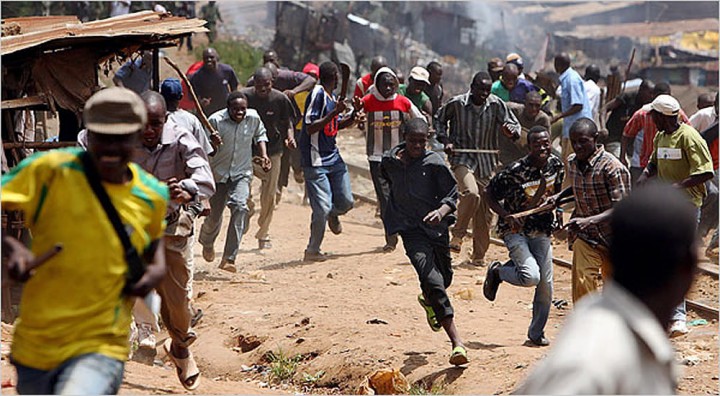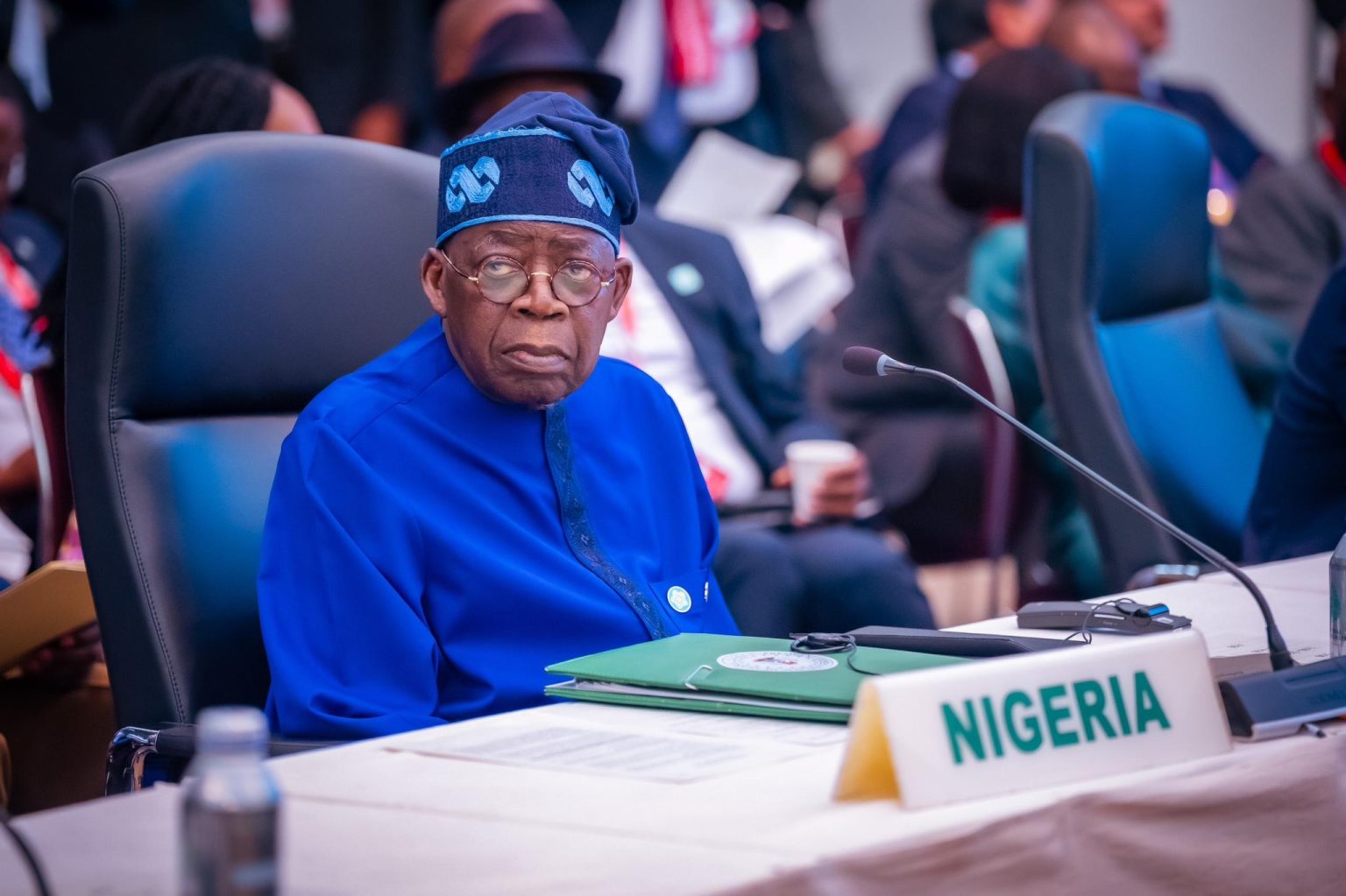Headlines
Untold Story Of Massacres In Taraba

- Gory Tales Of How women, Children and The Aged Were Hacked Down In Bali, Gashaka
- Gov Ishaku talks Tough, Charges Citizens On Peace
By Inuwa BWALA, who was in Jalingo
Taraba State may have passed through different phases of crises in the past, but the recent attack on Bali and Gashaka Local Government Areas of the state by Fulani marauders has been described as one attack too many. It was the unleashing of unprovoked anger on two sleeping communities, in which, women, children and the aged were at the receiving end.
The story may have been told from various angles, but no matter what was said of the particular incidents there seem more stories to be told, as our correspondent gathered that the casualty figure was deliberately downplayed and the degree of destruction also under reported in the media.
nationalTRAIL which has been following developments in Taraba State reveals that, what happened was a seeming vindication of Governor Darius Ishaku’s earlier fears over the mass influx of strangers into Taraba state, for which he sanctioned some traditional rulers, against fears that permeated Taraba State in the wake of the national security challenges.
The Governor, apparently seeing the warning signals, to the effect that nowhere was safe, had at a security meeting in Jalingo the State capital, shortly before the attacks on Bali and Gashaka took steps to stop the mass influx of non indigenes into some parts of Taraba. Ostensibly in active connivance with some traditional rulers, he was challenged on grounds of ethno religious sentiments.
At another forum, a senator from the state had alerted on the infiltration of Taraba state by people suspected to harbour hatred for the indigenous tribes, but again his fears were dismissed; on the grounds that it was a diatribe on some groups, only for the same strangers to manifest their true motives.
Even those who opposed both the Governor and the senator are now living in fears, with many lamenting that, the affected communities may never recover from the devastation caused, just as rebuilding the affected communities may take toll on the already fragile resources of the state. This is in addition to the dislocation of the long existing socio economic bonds, between herdsmen and the host communities in Taraba.
The destroyed structures, as well as the human casualties remain inestimable, a development that could have made the Governor, Darius Ishaku failing to control his emotions when he beheld the scenes of the massacre. But many Tarabans could not fault him now, as he had taken steps to nip the matter in the bud.
Ishaku who had just been confirmed as validly elected Governor of Taraba State, before the twin incidents, was said to have been at the verge of total emotional breakdown, seeing corpses all over the communities, amongst which were women, children and the aged. He could not afford the luxury of celebrating his hard earned victory with ease, and had to make it low keyed.
The Governor had in his remarks at the solemn ceremony following the renewed attacks on some communities in Gashaka and Bali vowed to eliminate any form of insurgency by evil agents within the borders of Taraba State, just as he maintained that his Government will leave no stone unturned in apprehending the perpetrators of the dastardly act.
nationalTRAIL recalls that, a group of unknown gun men, suspected to be Fulani herdsmen, unleashed terror on people in some communities in Gashaka and Bali Local Governments leaving over 44 persons dead, 5 injured, 6 missing and over 100 displaced women and children.
The affected communities are Dorei where 8 people were reported massacred and 6 children missing, Angai where over 20 people were reported killed and 5 injured, and Maisuma where 9 people were reported to have been shot dead while in Fali 7 people were reported killed.
Preliminary investigations reveal that the attack started with the attempted rape of a woman by the armed bandits and when the lady resisted the marauders decided to unleash mayhem on entire communities.
The truth about the immediate and remote causes of this last attack may not be known now, but investigations reveal that, the attacking herders were merely using their vocation as an alibi, as there may be a more sinister plot to destabilize Taraba, if accounts of some victims of the attack were anything to go by.
According to them, some of the attackers have foreign accent, and the type of weapons they carry are not the ordinary ones local herdsmen carry, making people to believe that there may be more than meets the eyes to the growing sophistication in the manner of the attacks.
Painting the gory picture of what took place that fateful Monday, one of the survivors of the mayhem, Musa Tanimu, told nationalTRAIL that, the attackers hacked down everything in sight, not sparing the women, children and the aged, whose cries of anguish rented the air, as everybody took flight from the communities, without any specific destination in mind.
“We returned the next day and took some of these pictures that I will give you; we want you to tell the world how we have been made captives in our own land by people we have sheltered over the years. We even give them our farms after harvest to feed their cattle, yet they still kill us”, he lamented in Hausa.
But the Government is looking beyond a mere quarrel over attempts to satisfy the sexual desires of Fulani young men, as according to sources, the Fulani’s have for long nursed the idea of displacing local communities in Taraba state and convert their farms to grazing fields.
The foreigners noticed amongst the antagonists may have been invited by their local kins, and they may have brought in the sophisticated weapons used during the attacks. Witnesses confirmed that the guns were similar to the ones being used by Boko Haram insurgents.
nationalTRAIL gathered that, it was against the background of consistent antagonism against Local Communities, coupled with intelligence reports available to the Government, that the Governor, Arc. Darius Dickson Ishaku took proactive steps to mitigate the influx of suspicious persons from some other States into Taraba. But even before then, people had already massively migrated to parts of Taraba State, some of whom had become threats to the host communities.
The Attack on Bali and Gashaka, our correspondent reports was one of series of such attacks in the past on farmers by Fulani herders. Reports indicate that some host communities had been completely sacked, while in others, many families had to flee their homes at certain hours of the day, thereby prompting strict measures by security agents.
In a press statement immediately following the attacks, Governor Ishaku’s spokesman, Sylvanus Giwa expressed the Government’s concern over the most recent killings, which he said was a major setback to current efforts by the Government to resettle IDPs to their homes and for people to resume their normal activities.
Our correspondent reports that, the attack has displaced over 100 women and children who are taking refuge in Mayo-Selbe, Kungana and Garbabi, while others have been relocated to Jalingo and other surrounding places presumed to be safer.
Long after the attacks had come and gone, tears are still flowing for the dead, hopes seem to be deeming for the return of the missing, the scars on those injured still remain visible, as the Government grapples to rebuild the confidence of citizens to return home. At this time of economic hardship, the fears may linger for long
Headlines
“Nigeria Is in a Hurry to Celebrate Victory Over Enemies of the State,” Says Tinubu as He Decorates New Service Chiefs

By: Fabian Apechihin
President Bola Ahmed Tinubu has urged the newly appointed service chiefs to discharge their duties with utmost dedication and renewed commitment, declaring that “Nigeria is in a hurry to celebrate victory over enemies of the state.”
The President made this statement on Thursday during the decoration ceremony of the new service chiefs with their ranks at the Aso Rock Presidential Villa in Abuja.
Those decorated were General Olufemi Oluyede as Chief of Defence Staff, Lieutenant-General Wahidi Shaibu as Chief of Army Staff, Air Marshal Kennedy Aneke as Chief of Air Staff, and Vice Admiral Idi Abbas as Chief of Naval Staff.
The ceremony was attended by Vice President Kashim Shettima and the spouses of the newly promoted officers, who joined the President in performing the decorations.
In his address, Tinubu underscored the central role of security in fostering national development and reaffirmed his administration’s commitment to protecting the lives and property of all Nigerians.
“Security is an essential element without which everything else becomes meaningless,” the President stated. “There can be no sustainable development if this fundamental need is not met. Our people and our nation must remain secure to enjoy the dividends of governance.”
The elevation and decoration of the new military chiefs followed their confirmation by the National Assembly on Wednesday, after a closed-door screening session with lawmakers.
It will be recalled that, in a recent overhaul of the nation’s military hierarchy, President Tinubu appointed:
- Lieutenant General Olufemi Olatubosun Oluyede as Chief of Defence Staff,
- Major General Waidi Shaibu as Chief of Army Staff,
- Rear Admiral Idi Abbas as Chief of Naval Staff,
- Air Vice Marshal Sunday Aneke as Chief of Air Staff, and
- Major General Emmanuel Undiandeye retained as Chief of Defence Intelligence.
The new appointments mark a strategic restructuring of Nigeria’s security leadership aimed at strengthening the fight against insurgency, banditry, and other threats to national stability.
Headlines
FG Dismisses Coup Rumour, Reaffirms Confidence in Nigerian Military

By: Fabian Apechihin
The Federal Government has dismissed widespread rumours of an alleged military coup plot against President Bola Tinubu, declaring its full confidence in the loyalty and professionalism of the Nigerian Armed Forces.
Minister of Information and National Orientation, Mohammed Idris, made this known in an interview with The Punch on Sunday, insisting that the administration has “no reason whatsoever” to doubt the assurances given by the Defence Headquarters, which had earlier denied reports linking the detention of 16 military officers to a coup attempt.
“The Federal Government has no reason to doubt the military on what it has said,” Idris stated.
“We believe the Armed Forces of Nigeria remain committed to protecting the nation’s territorial integrity and strengthening the fight against insecurity. The government commends their sacrifice and will continue to support them in safeguarding the country.”
The minister’s remarks came a day after the Director of Defence Information, Brigadier General Tukur Gusau, firmly debunked a report by Sahara Reporters alleging that the detention of 16 officers was connected to a failed coup plot and the cancellation of the 65th Independence Day parade.
Gusau described the publication as “false, mischievous, and deliberately aimed at creating unnecessary tension and public distrust.”
He clarified that the cancellation of the October 1 Independence Day parade was a purely administrative decision — taken to allow President Tinubu attend a key bilateral meeting abroad and to enable military units sustain ongoing counterinsurgency operations nationwide.
On the issue of the detained officers, Gusau said their case was “an internal disciplinary process” and not related to any political matter.
“The investigation involving the 16 officers is routine, aimed at upholding discipline and professionalism within the ranks,” he explained. “An investigative panel has been constituted, and its findings will be made public in due course.”
Reaffirming the military’s constitutional role and unwavering commitment to civilian rule, Gusau stressed emphatically:
“Democracy is forever.”
Headlines
FG Moves to Reform Civil Service Disciplinary System for Greater Efficiency

By: Fabian Apechihin
The Federal Government is set to overhaul the disciplinary control system in the civil service to promote efficiency, accountability, and timely resolution of cases.
The Chairman of the Federal Civil Service Commission (FCSC), Prof. Tunji Olaopa, made this known during a one-day joint retreat between the FCSC and the Office of the Head of the Civil Service of the Federation (OHCSF).
In a statement issued on Tuesday by the Commission’s Head of Press and Public Relations, Taiwo Hassan, Olaopa emphasized that the review would drive culture change, value reorientation, and improve the overall disciplinary framework in the public sector.
He likened the relationship between the FCSC and OHCSF to that of “Siamese twins,” noting that both bodies share crucial responsibilities in policy implementation, regulatory enforcement, and leadership across the service.
Olaopa also underscored the need for stronger collaboration and communication between the two institutions to avoid misunderstandings, build trust, and enhance service delivery.
The FCSC chairman further advocated for an integrated system that links merit-based recruitment, competency-driven human resource management, and performance evaluation with the civil service wage structure, saying such reforms would help reposition government as an “employer of choice.”
Speaking on behalf of the Head of the Civil Service of the Federation, Dr. Folasade Yemi-Esan, Esther Walson-Jack praised Olaopa’s reform initiatives, describing the retreat as a renewed commitment to strengthening collaboration and efficiency within the civil service.
The renewed push for reform follows rising concerns about bureaucratic bottlenecks, delayed disciplinary actions, and weak accountability mechanisms in Nigeria’s public administration.
-

 Uncategorized5 years ago
Uncategorized5 years agoFG, states urged to harness flooding for ranching, others with technology – Agbaje
-

 Headlines10 years ago
Headlines10 years agoBreaking: EFCC seals Borno House of Assembly, as Hon members take to their heels
-

 News11 years ago
News11 years agoNigeria Security Operatives Stage Manhunt For Homosexual Perpetrator
-

 News9 years ago
News9 years agoHow 21-year-old Girl fled community over accusation of lesbianism
-

 News10 years ago
News10 years agoYobe Gov Moves Against Deputy
-

 Opinion7 years ago
Opinion7 years ago7 signs she has friend zoned you
-
Technology4 years ago
Online job placement company headhunts women
-

 Headlines10 years ago
Headlines10 years agoBorno Dep Gov Abducts Another Church Leader





